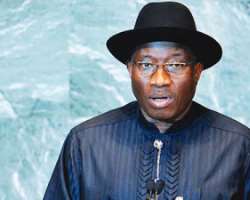The FG directive on boosting power supply - National Mirror

Reports indicated that the Minister of Power, Professor Chinedu Nebo, recently in Abuja at the inauguration of the Supervisory Board of the Transmission Company of Nigeria (TCN), disclosed that President Goodluck Jonathan had given a marching order to new private investors in the power sector to generate and transmit sufficient megawatts of electricity to ensure efficient power supply nationwide by June this year. The Federal Government directive seems justified as it is coming four months after the conclusion of the privatisation of the former inept and pathologically corrupt Power Holding Company of Nigeria (PHCN).
But critics of the power sector reform of President Jonathan's government and opposition political parties, especially the All Progressives Congress (APC), have dismissed the FG order as a mere propaganda to score a cheap political point. They pointed out that the recent demand by power sector investors for financial support from the FG barely after a few weeks of final handover of the distribution companies (Discos) and generation companies (Gencos) to the new owners suggested that the privatisation of the power sector was never an honest and credible endeavour; but a ploy by the ruling Peoples Democratic Party (PDP) to siphon funds from the nation's treasury under the subterfuge of funding the power sector. In other words, by soliciting for financial support so early in the day, the private power investors were suspected to be in a hurry to betray a private-public sector conspiracy to defraud the nation.
But even if the much vaunted power sector reform of the Jonathan dispensation is not a hoax meant to assist public officers hoodwink the people and loot the country's coffers, the dwindling and epileptic electric power supply situation nationwide since private investors took over seem an indication that the more resources the government commits to power projects in the country, the less that is realized in terms of electricity power service to Nigerians. It is not surprising, therefore, that many have reacted with cynicism, suspicion and distrust to the presidential directive that the new investors should improve power supply by June. The new power sector investors themselves reportedly view the FG deadline as a political statement that ought not to be taken seriously. They said it is 'too hot to touch'. The operators have fingered frequent disruptions in gas supply as a major obstacle to any genuine effort to meet improved electricity supply deadlines.
It is obvious that the TCN has not lived up to public expectation in its task of power transmission. All the huge resources already committed and funds routinely appropriated and disbursed to the TCN have not reflected in sufficient and efficient electric power supply in the country. The danger signals which worry consumers of electricity in the country are legion; and could be itemised as follows: power supply is still epileptic; power firms are already asking for lifeline as if that was the ulterior motive for investing in the power sector - to extort money from the FG; and power infrastructure destruction, such as gas pipeline rupture and vandalism still dog the power industry as if to justify the reservation of critics that expenditure in the industry is merely a conspiracy to siphon public resources. But notwithstanding the fact that there is still cause for worry in the power sector, we think that a milestone has been recorded by the FG in the successful hand over of the Discos and Gencos to private sector investors.
Besides, the failure of the firms to perform can still be dealt with in due course. The TCN now being manned by the American transmission company, Manitoba, appears to be still striving to muster technical strength and expertise to perform creditably. Luckily, too, there is a World Bank intervention calculated to correct the anomaly in the operations of Manitoba. Again, we dare say that the directive of the FG to the power firms to deliver sufficient and efficient electricity by June this year is in order. Though it may not be realized fully as directed, it will put the power companies on their toes - a warning signal that Nigerians expect them to perform and make a difference where the defunct PHCN failed the nation. Wholesome dismissal of the June deadline to the Discos and Gencos as a ruse may be unrealistic as yet.
But the power firms should demonstrate commitment to improved power delivery by supplying prepayment meters to all consumers of electricity in the country to ensure appropriate and accurate billing; put an end to the outrageous estimated or 'coded' billing system, and abolish the fixed rates in the prepayment meters to prevent cynics and critics from rubbishing the privatization of the power sector as a huge gamble. Extorting money from electricity consumers for power not supplied is fraudulent, unjust, immoral and, therefore, unacceptable.
